Ready For Some Spring … Plumbing?
Modern plumbing systems are the successful end products of decades upon decades of research and development. Continuous refinement and improvements include not just the techniques and best practices of the plumbers themselves but of the materials with which those plumbers do their work. From the early days of lead pipes, all the way through more modern variations, such as galvanized steel, copper, polyvinyl chloride (PVC), and cross-linked polyethylene (PEX), the plumbing trade has seen a steady march toward sturdier and more efficient methods.
That’s why most homeowners can go many years without having anything too disastrous happen with their plumbing systems. It’s also why plumbers have become something more like a technician than a fittings-and-washers installer. Years of rigorous and sustained testing has finally delivered to the American homeowner plumbing systems that are reliable and eco-friendly.
Still, as we all know, if something can go wrong, it will. Despite all that technological advancement and increasing industry know-how, plumbers still urge property owners to undertake a few simple measures to ensure that their plumbing systems are built to last and working as intended. It doesn’t take a plumbing master to do these things, either. Anyone can partake in these check-up activities — even people with zero plumbing experience.
If you’ve got a flashlight, you can perform spring plumbing maintenance. As the old saying goes, an ounce of prevention is worth a pound of cure. With that in mind, here are a few spring plumbing maintenance tips that should help keep your plumbing system in tip-top shape. Think of this as your Plumbing Spring Cleaning Guide!
5 Spring Plumbing Maintenance Tips
- Consider your water consumption. Does your water bill continue to increase year over year. This may be because of inefficient plumbing fixtures rather than inflation. Consider installing low-flow showerheads, faucets, and toilets. Simpson Plumbing can help. Contact us today with any questions!
- Check for leaks. Check all your home’s faucets — inside and out. Also check any visible pipes — for example, those under your kitchen and bathroom sinks. If you see water anywhere, let us know, and we’ll diagnose the problem and get it fixed.
- Give it the smell test. Do you smell something that seems like mold or mildew — or just generally a wet or moist smell coming from somewhere that you can’t see? That may be a sign of a leaky pipe inside your walls. If you think that may be the case, call Simpson Plumbing. We can do video inspections of your plumbing system!
- Check your drains for clogs. This is especially important if you notice that some of your sinks are draining more slowly than usual. Drain cleaners can be purchased at the supermarket and are easy to use. Remember to read the directions carefully.
- Consider your water heater. Depending on the make and model — as well as its age — you may want to drain some water from your water heater. This is to help prevent sediment from building up inside. As always, contact Simpson Plumbing with any questions. Think it might be time for a new water heater? We perform expert water heater installations.
At Simpson Plumbing, we’re happy to help diagnose and fix problems with your plumbing system. Contact us today to get started!


 About Us
About Us  Services
Services  Plans
Plans  Commercial
Commercial